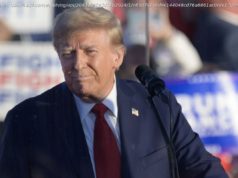It puts human rights aside to make a buck.
President Trump has just announced the sale of a whopping to Saudi Arabia which includes “tanks and helicopters for border security, ships for coastal security, intelligence-gathering aircraft, a missile-defense radar system, and cybersecurity tools, ” reports. It forms part of a 10-year, agreement in a “ ” between the two countries, reports the Washington Post. The deal had been in the works for some time, but the White House pushed hard to finalize the deal in time to announce it during the president’s trip to Saudi Arabia. It was meant to send a clear message: Trump isn’ t going to do things the way his predecessor did. Back in September, the Obama administration approved a more than arms deal with the Saudis. But as the death toll and reports of human rights violations in the Saudi-led war on Yemen began to, the Obama administration nixed the sale of the precision-guided munitions it had originally agreed to put in the deal to try to coerce the Saudis into curbing those atrocities. Now those munitions are back in the Trump arms package — which speaks volumes about this administration. In fact, the entire deal paints a vivid picture of the Trump administration — an administration that is willing to bend over backwards to make deals with important friends, that doesn’ t let human rights concerns get in the way of doing business, and where personal relationships with those closest to the president can prove highly lucrative. Jared Kushner, the president’s senior adviser and son-in-law, seems to have played a pivotal role in the deal, swooping in to personally help push the Saudis to finish the deal in time for Trump’s Saudi trip. As the reports, most of the agreement was already in place when Kushner got involved. But during a final meeting, a US official brought up the possibility of adding a “sophisticated radar system designed to shoot down ballistic missiles” to the Saudis’ shopping list. Iran, Saudi Arabia’s main adversary, has an excellent, so the Saudis were naturally interested in that kind of system. There was just one problem: the price tag. This is where Kushner comes in. Kushner evidently picked up the phone right there in the middle of the meeting and called Marillyn Hewson, the CEO of Lockheed Martin (the company that makes the system) , and the Times notes. Hewson apparently said she “would look into it, ” according to the Times. There are a few things to note from this vignette. First, it shows to what lengths this administration will go to make a deal when it really matters. And Saudi Arabia really, really matters. Trump wants (and needs) the country’s help to fight ISIS and the extremist ideology driving it. But there’s another reason pleasing Saudi Arabia matters to Trump: Bloomberg reports that the kingdom is considering investing around in US infrastructure. Trump wants to spend on improving American infrastructure, and the Saudi money would certainly help achieve that goal. Second, the more libertarian-leaning members of the Republican party who have complained that many of Trump’s policy inclinations go against traditional conservative principles now have yet another data point to make their case. After all, this is a clear example of the government directly interfering in the free market by trying to get a company to change its price on an item. Even worse, one of the president’s senior advisers purposefully fought to make a US company money in order to help another country out. I very much doubt that’s what most Trump voters expected his “America First” policy to look like. Finally, the fact that Kushner himself was at the center of the whole thing is especially notable. Whereas foreign military sales in the past would be negotiated through multiple US government bureaucracies, countries can now apparently skip all that red tape and go right to the source as long as they forge a relationship with Kushner. And you better believe that other countries are paying attention to that. Trump hailed the deal as a victory, saying it “was a great day” because of “tremendous investments in the United States. . and jobs, ” reports the. He couldn’ t be prouder of this. And it is a big deal — but the Obama administration approved an ever bigger, arms sale to the Saudis back in September that included “weapons, other military equipment, and training, ” according to. And though relations between the two countries were during the Obama years due in large part to the administration’s overtures to Iran, it was still the biggest deal ever offered in the history of the US-Saudi alliance. But it came with another price. The Saudis, with support of the US and several other regional allies, have led a two-year campaign against the Houthis, an Iranian-backed armed group that is trying to dislodge the Saudi-backed Yemeni government. The war has been brutal and has produced a humanitarian catastrophe on a staggering scale: since the war began in March 2015. Millions more are currently at risk of famine. Saudi warplanes have hospitals, schools, roads, bridges, farms, livestock, and other civilian targets with zero regard for either the laws prohibiting such tactics in wartime or the horrendous suffering they’ re inflicting on innocent civilians. The Obama administration increasingly tried (although not hard enough to make any noticeable difference) to use its leverage over the Saudis — in particular, US military support and arms sales — to compel the Saudis to stop these sorts of flagrant human rights violations. Trump, on the other hand, doesn’ t prioritize human rights or values in his foreign policy. He claims his foreign policy is solely based on the national interest. As he during the campaign, the United States will “finally have a coherent foreign policy based upon American interests and the shared interests of our allies” should he become president. Trump seems more than willing to cast aside the growing evidence of the kingdom’s brutal actions in Yemen in order to pass an arms deal — especially if he thinks he can get something out of it in return. And that’s precisely why Saudi Arabia — and numerous other countries who have been lectured about human rights by the Obama administration for the past eight years — are so happy to have Trump in the Oval Office now.
Home
United States
USA — Criminal What America’s new arms deal with Saudi Arabia says about the Trump...






